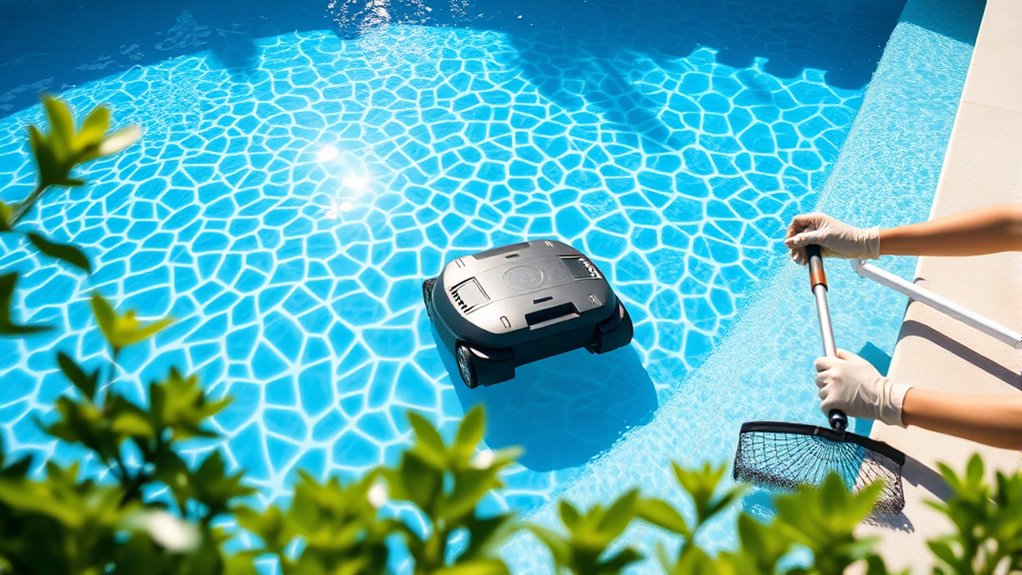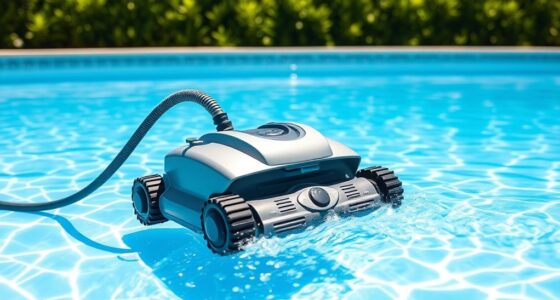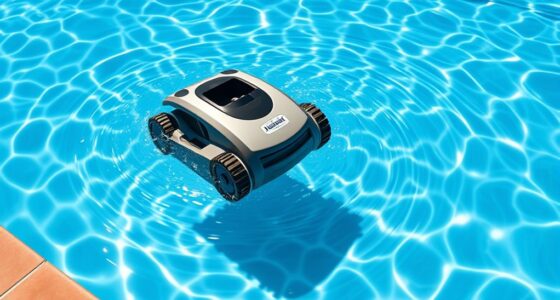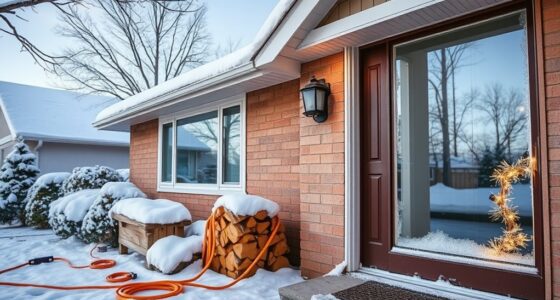While automatic cleaners handle much of the dirt and debris, you still need to perform essential manual tasks. You should regularly check and adjust chemical levels, skim debris from the surface, and remove stubborn leaves with a net. Also, inspect and clean the filter, monitor water levels, and inspect equipment for issues. Staying on top of these tasks keeps your pool clear and healthy—if you want to learn more, keep exploring the details.
Key Takeaways
- Regularly check and adjust water chemistry, including pH and sanitizer levels, to maintain water quality.
- Manually skim surface debris and remove stubborn leaves to prevent clogging and staining.
- Inspect and clean the pool filter regularly to ensure optimal flow and prevent clogs.
- Perform routine equipment inspections, including pumps and lights, to identify issues early.
- Monitor water levels and top off as needed to support automatic cleaner operation and proper circulation.
Regularly Checking and Adjusting Chemical Levels
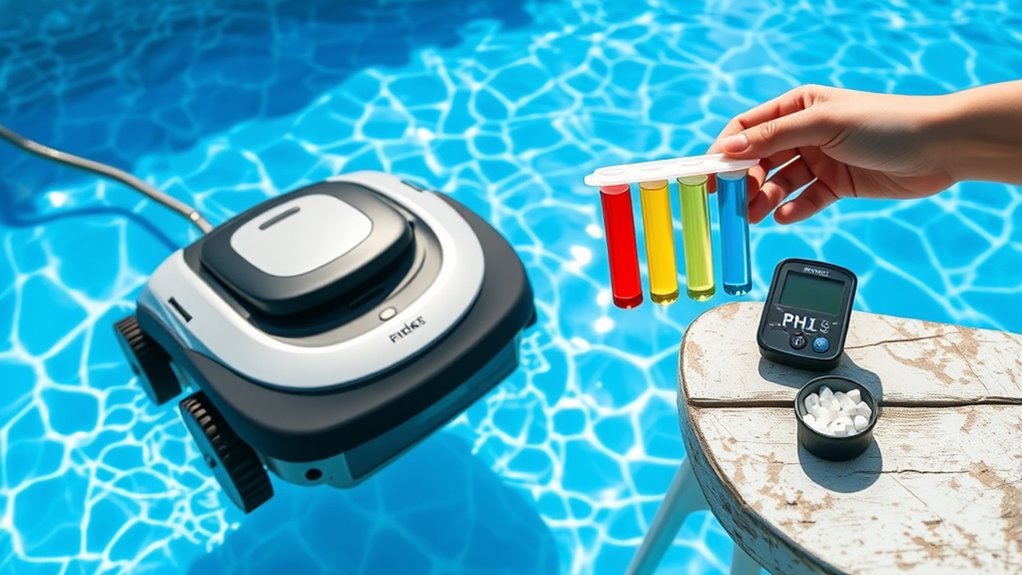
To keep your pool clean and safe, you need to regularly check and adjust its chemical levels. Maintaining proper chemical balance is essential for safe swimming and protecting your equipment. Start by testing the pH level, which should be between 7.2 and 7.6. If the pH is too high, add a pH reducer; if it’s too low, add a pH increaser. Regular pH adjustment prevents issues like cloudiness and algae growth. Use reliable test kits or digital testers for accurate readings. Keep an eye on other chemicals like chlorine to ensure sanitizer levels stay within recommended ranges. Consistent monitoring and adjustments help prevent problems before they start, making your automatic cleaner’s job easier and your pool safer and more inviting. Chemical balance is influenced by various factors, including rain, temperature, and pool usage, so regular checks are vital. Staying informed about water chemistry helps you better understand how different factors affect your pool’s condition. Silky tantrums and pet antics can sometimes disrupt the process, so staying vigilant ensures your pool remains in optimal condition. Additionally, understanding how different filter systems work can improve your chemical management strategies.
Manually Brushing Pool Walls and Floor

Have you ever noticed algae or dirt buildup on your pool’s walls and floor? If so, manual brushing is essential for effective algae removal. Use firm, steady brush strokes to scrub the surfaces thoroughly, paying attention to corners and crevices where algae can hide. Regular brushing helps loosen debris and prevents algae from taking hold, especially in areas where automatic cleaners might miss spots. By physically removing buildup, you enhance the overall cleanliness of your pool and reduce strain on your filtration system. Make sure to choose the right brush for your pool’s surface—stiff brushes for concrete and softer ones for vinyl or fiberglass. Consistent manual brushing keeps your pool looking clear and helps maintain proper chemical balance. Proper technique and regular maintenance also support the effectiveness of your filter system, ensuring optimal water quality and preventing the growth of harmful pathogens. Incorporating manual cleaning into your routine can significantly extend the lifespan of your pool equipment and improve water clarity. Additionally, understanding affairs—cheating husband secrets can help you maintain a peaceful environment, free from unexpected disruptions that could impact your poolside relaxation.
Inspecting and Cleaning the Pool Filter
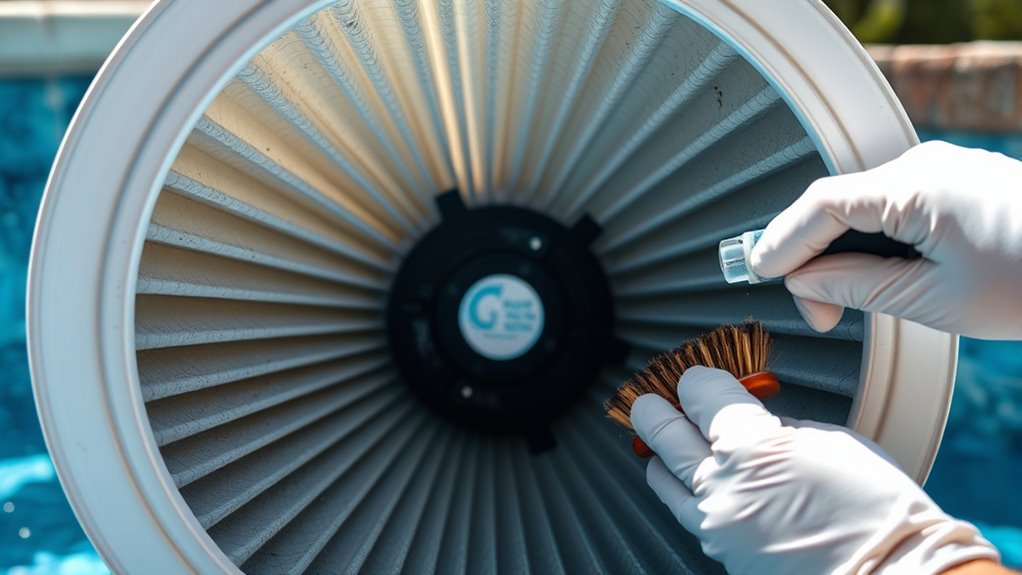
Regularly inspecting your pool filter helps guarantee it runs efficiently and keeps your water clear. You should check it often for signs of clogs and clean the components as needed. Recognizing when the filter is overwhelmed prevents damage and maintains ideal filtration. Incorporating performance cookies and data-driven strategies into your maintenance routine can lead to measurable improvements in pool clarity and equipment longevity. Staying informed about best maintenance practices ensures you can address issues promptly and extend the lifespan of your pool system. Monitoring for signs of spoilage in pool equipment can help prevent costly repairs and ensure safe, clear water. Understanding trust issues related to equipment failures can also help you identify underlying problems early and maintain your pool’s performance.
Filter Inspection Frequency
Inspecting and cleaning your pool filter regularly is essential to keep your automatic cleaner running efficiently. How often you check the filter impacts its performance and your pool’s clarity. Typically, you should:
- Follow your filter’s backwashing schedule to prevent buildup that hampers flow. Regular backwashing helps maintain optimal filter performance and prolongs the lifespan of your equipment. Incorporating essential oils for respiratory health, such as eucalyptus or peppermint, can also support overall pool air quality by reducing airborne bacteria and improving breathing conditions around your pool area.
- Replace filter media when it’s worn or clogged to maintain ideal filtration.
- Monitor pressure gauges—rising pressure indicates it’s time for inspection.
- Stay proactive; regular inspections prevent costly repairs and keep your pool sparkling. Incorporating Kia Tuning principles, such as optimizing system performance, can also help maintain your filtration setup.
- Leverage automation in business intelligence to analyze your maintenance data and optimize inspection schedules. Additionally, adopting advanced automation technology can provide real-time monitoring of your filter’s status, ensuring timely interventions.
Cleaning Filter Components
Cleaning your filter components is a crucial step to guarantee your automatic cleaner performs at its best. Regular filter component maintenance ensures debris doesn’t clog your system, which can reduce efficiency. Start by turning off your pump and removing the filter parts, such as the skimmer basket and pump basket. Rinse them thoroughly with a garden hose to clear out dirt and debris. For cartridge filters, gently scrub the cartridges with a soft brush to remove buildup. While cleaning, check for signs of damage or wear. Remember, maintaining clean filter components helps keep your pool water clear and balanced. Proper chemical balancing also supports filter efficiency, preventing algae growth and mineral buildup, which can compromise filter performance over time. Routine maintenance is essential for long-term filter health and optimal pool operation. Consistent upkeep keeps your system running smoothly, preventing costly repairs and extending the lifespan of your equipment. Additionally, inspecting filter cartridges regularly can help identify early signs of deterioration before issues become serious. Incorporating energetic alignment during maintenance routines can also promote a more harmonious operation of your pool system.
Signs of Filter Clogs
How can you tell if your pool filter is clogged? You might notice your pool skimmer struggling to keep up, with debris floating rather than being filtered out. Reduced water flow from the return jets is another sign, indicating the filter isn’t circulating properly. Increased algae growth, despite your efforts to prevent it, can also signal a clog. Finally, if your automatic cleaner is working harder than usual or getting stuck, it’s a clear warning. Regularly inspect and clean your filter to prevent clogs that compromise algae prevention. Proper filter maintenance is essential for efficient pool operation. Keep an eye on these signs to maintain clear, healthy water and ensure your pool stays inviting all season long. Don’t ignore these cues—your pool’s health depends on it. Maintaining your pool filtration system helps optimize overall performance and prolongs equipment lifespan.
Skimming Surface Debris by Hand

Despite the convenience of automatic pool cleaners, manually skimming the surface remains an essential task to keep your pool pristine. Floating debris like leaves, insects, and dirt can quickly accumulate, even with an automatic cleaner working below the surface. Regular surface skimming removes these materials before they sink or cause staining. To do this effectively, use a handheld net or skimmer, gliding it across the water’s surface to catch debris. This quick, manual task helps prevent clogs and maintains clear, inviting water. You should perform surface skimming daily or as needed, especially after storms or windy days. Even with automatic cleaners, a few minutes of hand skimming ensures your pool stays clean and the water quality remains high.
Monitoring Water Levels and Top-Offs
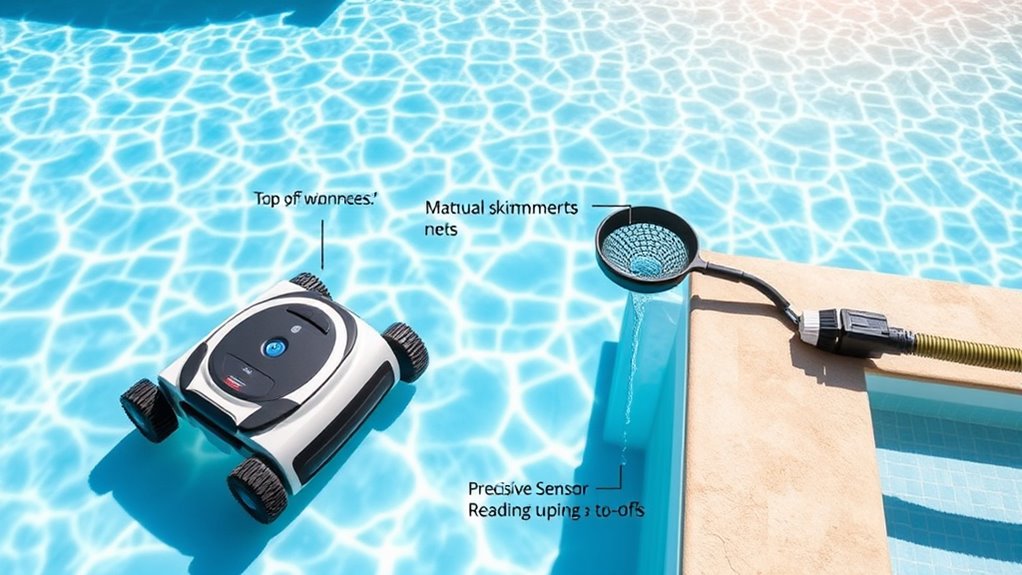
You need to regularly check your pool’s water level to guarantee the automatic cleaner works efficiently. When levels drop, you’ll have to perform manual top-offs to maintain proper circulation. Keeping an eye on water levels helps prevent damage and keeps your pool sparkling clean.
Water Level Checks
Regularly checking your pool’s water level is essential to keep your automatic cleaner functioning properly. If the water drops too low, debris can clog the system, and your pool temperature or lighting might be affected. Keeping the level just right ensures ideal circulation and clarity.
Here are four reasons why water level checks matter:
- Prevents damage to the automatic cleaner’s pump.
- Maintains consistent pool temperature and lighting.
- Ensures proper skimming and filtering.
- Saves you time and money on costly repairs.
Manual Top-Off Procedures
Monitoring your pool’s water level and performing manual top-offs when needed is essential for effective automatic cleaner operation. When water levels drop, your cleaner may struggle to function properly, leading to poor cleaning and potential equipment strain. Regularly check for signs of chemical imbalance, which can promote algae growth if levels become too low. Maintaining proper water levels helps ensure the correct chemical balance, preventing algae buildup and other issues. As you top off your pool, use fresh water to restore the appropriate level, especially after heavy use or evaporation. Keeping the water at the recommended level supports both your automatic cleaner’s performance and overall pool health, reducing the risk of algae and other contaminants that can arise from fluctuating water levels.
Inspecting Pool Equipment and Pumps
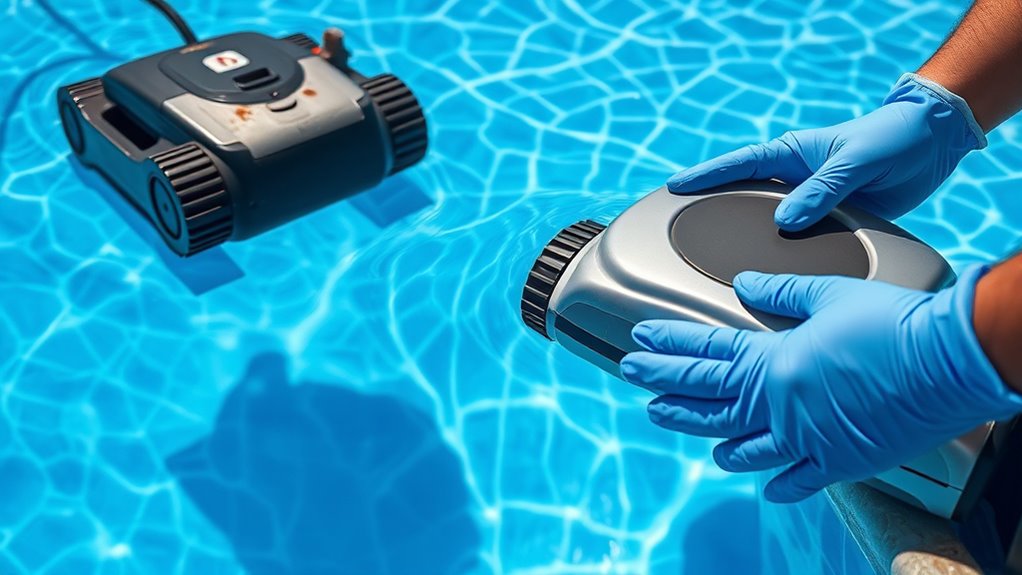
Inspecting your pool equipment and pumps is essential for maintaining ideal performance and preventing costly repairs. Regular checks ensure your pool heater runs efficiently and lighting fixtures stay bright.
To keep everything in top shape, focus on these key areas:
- Examine the pool heater for leaks, corrosion, or unusual noises that could signal trouble.
- Inspect lighting fixtures for corrosion or burnt-out bulbs, ensuring safety and ambiance.
- Check pump filters and impellers for debris or blockages that hinder circulation.
- Ensure all connections and hoses are secure, preventing leaks and system failures.
Performing these inspections regularly helps you catch issues early, saving money and extending the life of your equipment. Stay proactive, and enjoy a trouble-free swimming season.
Removing Stubborn Debris and Leaves
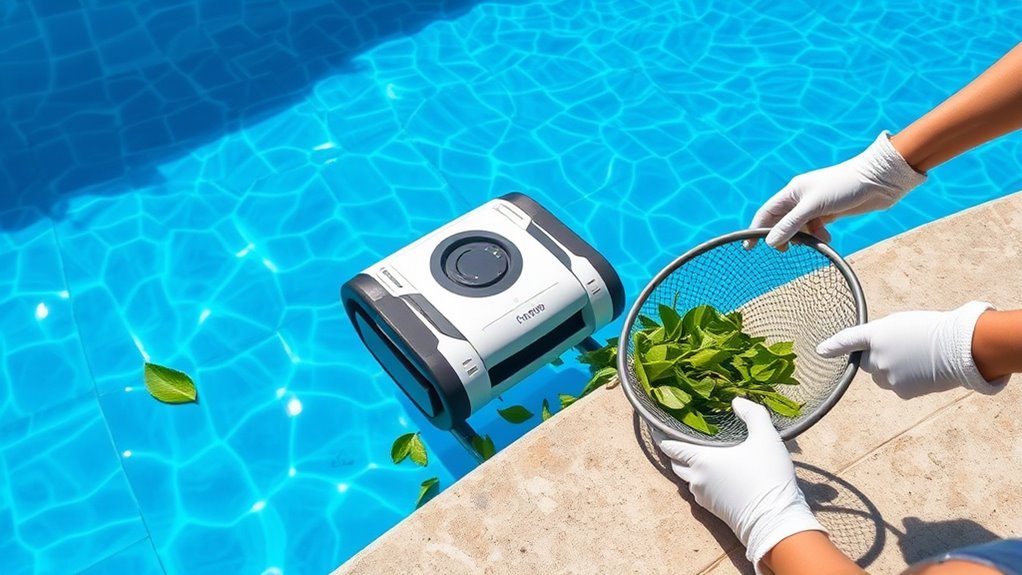
Even with well-maintained equipment, stubborn debris like leaves and twigs can still accumulate on your pool’s surface and bottom. To keep your pool clean, you’ll need to perform regular leaf removal and debris clearing. Use a leaf skimmer or net to manually remove large leaves that the automatic cleaner might miss. Focus on areas where debris tends to collect, such as corners and along the pool edges. Clear out floating debris daily to prevent it from sinking and rotting, which can affect water quality. For stubborn leaves that cling to the bottom, gently use a pool brush or vacuum to loosen and remove them. Consistent debris clearing helps maintain water clarity and reduces strain on your automatic cleaner, keeping your pool pristine.
Winterizing and Covering the Pool
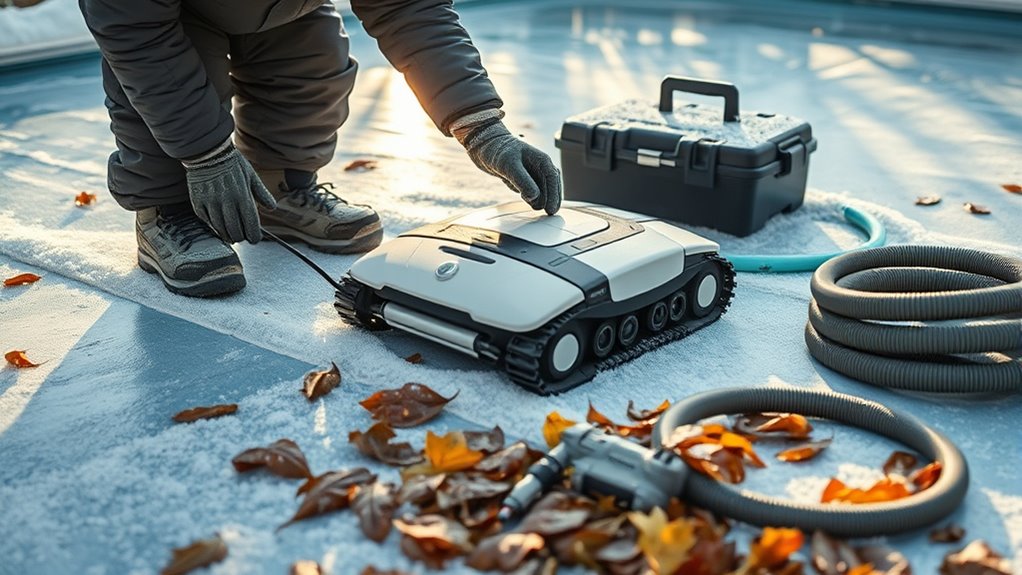
As winter approaches, it is vital to properly winterize and cover your pool to protect it from the harsh elements. Taking these steps ensures your investment stays safe and minimizes damage. Remember, winterizing also involves deck maintenance, preventing ice expansion from cracking surfaces and keeping your pool area safe. When covering your pool, verify the cover is secure to prevent debris from entering later.
Here are four essential tasks:
- Drain and balance the water chemistry to prevent freezing damage.
- Clean and remove all debris, including automatic cleaners.
- Cover the pool tightly, ensuring safety for children and pets.
- Inspect and maintain the cover regularly for wear or damage.
Proper winterizing preserves your pool’s condition and promotes safer pool safety for spring reopening.
Frequently Asked Questions
How Often Should I Manually Check Chemical Levels?
You should check your chemical levels at least twice a week to keep your pool safe and balanced. Regularly inspect your pool cover for debris and damage, and follow a seasonal cleaning schedule to prevent buildup. Manual checks help catch imbalances early, ensuring your automatic cleaner works efficiently. Don’t forget, consistent chemical testing and pool cover inspection are essential for maintaining a clean, healthy pool all season long.
What Tools Are Best for Brushing Stubborn Algae?
For stubborn algae, you’ll want the right tools like a stiff-bristled brush or algae scrubber. Brush frequency depends on how quickly algae appears, but generally, you should scrub affected areas weekly to prevent growth. Regular brushing helps with algae prevention by disrupting its buildup. Focus on corners and the pool’s bottom, and don’t forget to check chemical levels beforehand to guarantee ideal cleaning conditions.
How Do I Safely Remove Large Debris From the Pool?
You might think automatic cleaners handle all debris, but large debris needs manual removal for safety and efficiency. Start by using a leaf net or skimmer to remove leaves and big debris, preventing clogging. Carefully dispose of the debris in a trash bag or compost if suitable. Regular leaf removal keeps your pool clean and prevents damage to your automatic cleaner, making debris disposal a simple, safe task.
When Should I Replace or Upgrade My Pool Filter?
You should replace or upgrade your pool filter when it reaches its filter lifespan, typically between 5 to 7 years, depending on usage and type. If you notice decreased water flow, frequent clogging, or your pool isn’t as clean despite regular maintenance, it’s time to contemplate an upgrade. Upgrading ensures better filtration, energy efficiency, and clearer water, keeping your pool in top condition with less hassle.
What Are Signs My Pool Needs Professional Maintenance?
You might wonder if your pool needs professional maintenance when you notice reduced water clarity despite your efforts. Cloudy or murky water signals underlying issues like equipment wear or algae buildup. Additionally, if your pool equipment’s lifespan is nearing its end or shows frequent breakdowns, it’s time to call in experts. Professional maintenance guarantees your pool stays crystal clear, extends equipment life, and keeps your swimming experience enjoyable and safe.
Conclusion
Sure, your automatic cleaner does a lot, but don’t get too comfortable. You still get to play chemical mixologist, brush away stubborn algae, and wrestle with leaves that refuse to be sucked up. Think of it as your weekly spa day—if spa days involved manual labor and a touch of frustration. So, enjoy the high-tech marvel, but remember, a pool’s beauty still depends on your hands-on magic. Happy cleaning!
